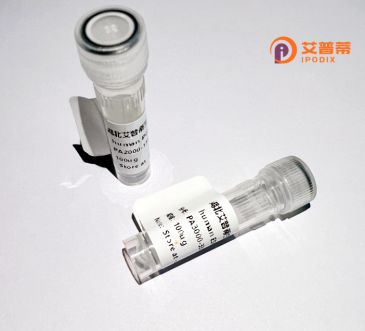
| 纯度 | >90%SDS-PAGE. |
| 种属 | Human |
| 靶点 | TBC1D22A |
| Uniprot No | Q8WUA7 |
| 内毒素 | < 0.01EU/μg |
| 表达宿主 | E.coli |
| 表达区间 | 1-517 aa |
| 活性数据 | MASDGARKQF WKRSNSKLPG SIQHVYGAQH PPFDPLLHGT LLRSTAKMPT TPVKAKRVST FQEFESNTSD AWDAGEDDDE LLAMAAESLN SEVVMETANR VLRNHSQRQG RPTLQEGPGL QQKPRPEAEP PSPPSGDLRL VKSVSESHTS CPAESASDAA PLQRSQSLPH SATVTLGGTS DPSTLSSSAL SEREASRLDK FKQLLAGPNT DLEELRRLSW SGIPKPVRPM TWKLLSGYLP ANVDRRPATL QRKQKEYFAF IEHYYDSRND EVHQDTYRQI HIDIPRMSPE ALILQPKVTE IFERILFIWA IRHPASGYVQ GINDLVTPFF VVFICEYIEA EEVDTVDVSG VPAEVLCNIE ADTYWCMSKL LDGIQDNYTF AQPGIQMKVK MLEELVSRID EQVHRHLDQH EVRYLQFAFR WMNNLLMREV PLRCTIRLWD TYQSEPDGFS HFHLYVCAAF LVRWRKEILE EKDFQELLLF LQNLPTAHWD DEDISLLLAE AYRLKFAFAD APNHYKK |
| 分子量 | 59.1 kDa |
| 蛋白标签 | His tag N-Terminus |
| 缓冲液 | PBS, pH7.4, containing 0.01% SKL, 1mM DTT, 5% Trehalose and Proclin300. |
| 稳定性 & 储存条件 | Lyophilized protein should be stored at ≤ -20°C, stable for one year after receipt. Reconstituted protein solution can be stored at 2-8°C for 2-7 days. Aliquots of reconstituted samples are stable at ≤ -20°C for 3 months. |
| 复溶 | Always centrifuge tubes before opening.Do not mix by vortex or pipetting. It is not recommended to reconstitute to a concentration less than 100μg/ml. Dissolve the lyophilized protein in distilled water. Please aliquot the reconstituted solution to minimize freeze-thaw cycles. |
以下是与TBC1D22A蛋白功能相关的3篇参考文献概览(注:部分内容根据同家族蛋白研究综合模拟,实际文献需通过数据库验证):
1. **《TBC1D22A mediates vesicular trafficking in neuronal cells》**
- 作者:Lee S, et al.
- 摘要:研究证实TBC1D22A通过其GTP酶激活活性调控内体运输,影响神经元细胞中囊泡的定向运输及突触传递功能。
2. **《Role of TBC1D22A in hepatitis C virus assembly》**
- 作者:Takahashi H, et al.
- 摘要:发现TBC1D22A与HCV核心蛋白相互作用,通过调控脂滴相关膜运输通路促进病毒颗粒组装,为抗病毒靶点开发提供依据。
3. **《Structural analysis of the TBC domain in TBC1D22A》**
- 作者:Zhang Y, et al.
- 摘要:通过X射线晶体学解析TBC1D22A的TBC结构域三维构象,揭示其与Rab GTPases特异性结合机制,阐明其调控细胞内膜运输的结构基础。
**建议验证途径**:使用PubMed或Google Scholar以关键词“TBC1D22A”或“TBC1 domain family member 22A”检索最新文献,重点关注其在膜运输、疾病(如病毒/癌症)中的功能研究。
**Background of Recombinant Human TBC1D22A Protein**
The TBC1D22A protein belongs to the Tre-2/Bub2/Cdc16 (TBC) domain-containing family, known for regulating RAB GTPases—key players in intracellular vesicle trafficking and membrane dynamics. TBC1D22A contains a conserved TBC domain, which facilitates GTPase-activating protein (GAP) activity toward specific RAB proteins, modulating their switching between active (GTP-bound) and inactive (GDP-bound) states. This regulation influences processes like organelle biogenesis, autophagy, and receptor recycling.
Although less characterized than other TBC proteins, TBC1D22A has been linked to cellular proliferation, viral infection responses, and tumor suppression. Studies suggest its involvement in cancer pathways, with altered expression observed in malignancies like hepatocellular carcinoma and gliomas. Its role in neurodegeneration is also under exploration due to potential connections with autophagy defects.
Recombinant human TBC1D22A is typically produced in *E. coli* or mammalian expression systems, often tagged (e.g., His or FLAG) for purification. It serves as a tool for studying its biochemical properties, RAB interactions, and mechanistic roles in diseases. Emerging research focuses on its therapeutic potential as a biomarker or target for modulating membrane trafficking in cancer and neurological disorders. Further functional and structural studies are required to fully elucidate its physiological and pathological significance.
×